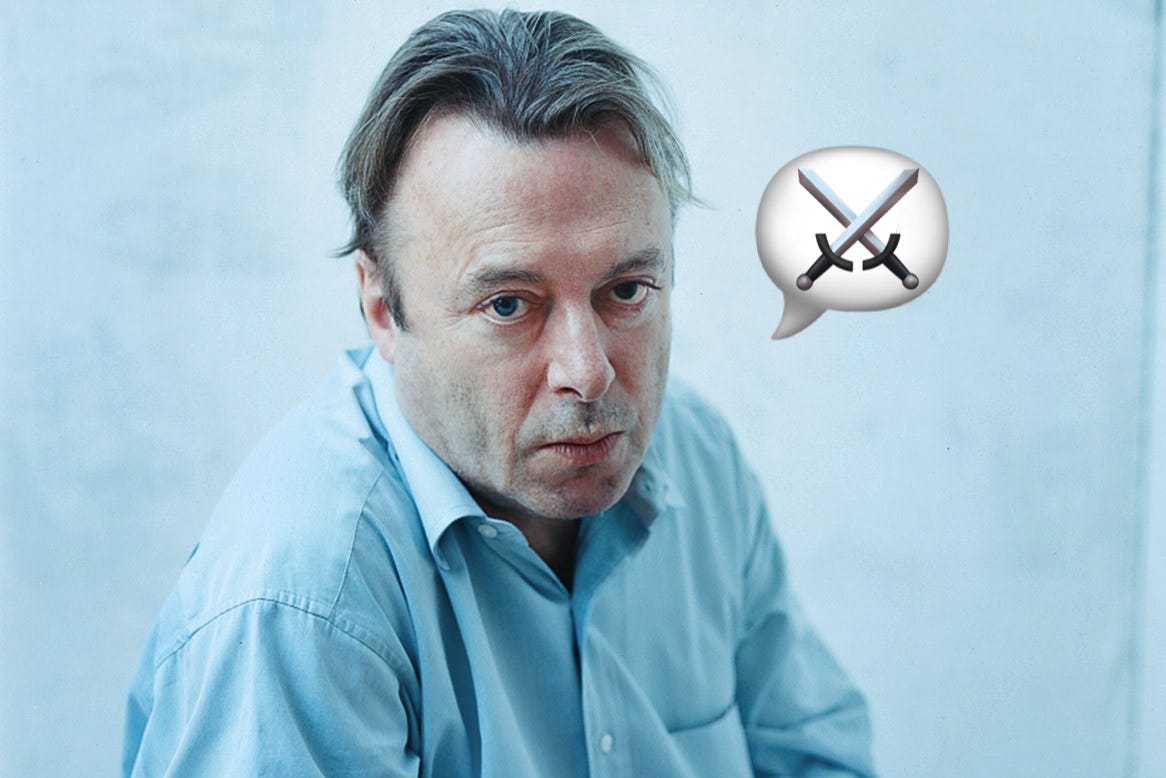Missing Hitchens
Or, the love of the fight

What would Hitch say?
This question becomes more and more interesting as the world becomes less and less predictable. Christopher Hitchens, who died of cancer in 2011, held strong opinions about Mother Teresa, sex, Iraq, socialism, men, communism, women, capitalism, waterboarding, Europe, champagne, America, P.G. Wodehouse, atheism, feet, Islam, Harry Potter, and everything else.
Objectively, some of these opinions were wrong. A great atheist is, by definition, fallible. But equally objectively, all of these opinions were well delivered. And that’s because he was always fighting with someone. As he said in 2008,
The world I live in is one where I have five quarrels a day, each with someone who really takes me on over something; and if I can’t get into an argument, I go looking for one, to make sure I trust my own arguments, to hone them.
You didn’t read Hitchens to find out what to think; you read him for sheer pleasure. You read him for lines like “Redneck is only a rude word for WASP,” and further observations like “Can we not eliminate the redundancy from the acronym WASP? It’s not as if there were any BASPs. Doesn’t ASP convey precisely the same connotation with even more economy?”
At his best, he could quickly eviscerate a brainless bit of jargon, like:
‘Zero tolerance’ literally means, and literally intends, complete intolerance.
And:
I decline to use the word ‘illegitimate’ as a description of a baby.
For Hitch, writing was fighting, and it tended to produce pamphlets, not full-length books. The exception that proves this rule was his bestseller god is Not Great; he had to take on multiple heavens to really inhabit 200+ pages.
When he picked a particularly pungent line of argument, like his infamous Vanity Fair column on Why Women Aren’t Funny, he got the opponents he deserved. In Tina Fey’s words: “I don’t like Chinese food, but I don’t write articles trying to prove it doesn’t exist.”
“Some spirit went out of the world of letters with him,” George Packer wrote in The Altantic last month. It seems counterintuitive to say that what today’s discourse needs is more fighting, so maybe it’s better to say it needs more of the good fight, the one fought to find the best idea. Hitchens wanted to do battle more than he wanted victory, and that’s the distinction. His sound and fury signified something.
Yesterday Pope Francis urged Catholics to give up trolling for Lent, describing the world as “polluted by too much verbal violence, by many offensive and harmful words, which the internet amplifies.” Hitchens excelled at verbal violence, and Francis seems exactly the character he’d eviscerate. “I devoutly believe that words ought to be weapons,” Hitch wrote. “That is why I got into this business in the first place.”
And yet when it comes to disgust over weasel words, the pope and the anti-theist are on the same team. Francis spoke of a world “inundated with empty words, with advertisements, with subtle messages” and Hitchens fought for “a pure speech that means what it says, and that can be subjected to refutation in its own terms.”
Christopher Hitchens’ weapon of choice was irony, “the gin in the Campari, the X-factor, the knight’s move on the chessboard, the cat’s purr, the knot in the carpet.” So in an era of bad faith, it is right to miss a man of no faith because he argued in good faith.
Quick quips; lightning
It is only the intellectually lost who ever argue. Oscar Wilde
I would never die for my beliefs because I might be wrong. Bertrand Russell
I am prepared to meet my Maker. Whether my Maker is prepared for the great ordeal of meeting me is another matter. Winston Churchill
That makes 35 Get Wit Quicks, your weekly pain in the arsenal of language. Hitch knew puns were bad but, like alcohol and tobacco, he couldn’t resist. In Elements of Wit: Mastering The Art of Being Interesting, he’s cited in chapters on Brevity, Compassion, Hustle, Refreshment, and Romance. Speaking of romance, there’s a ❤️awaiting your tap below.

